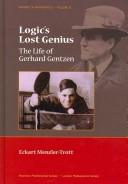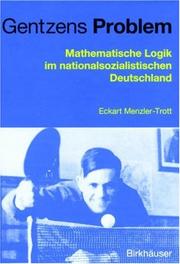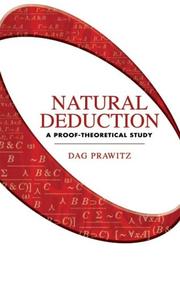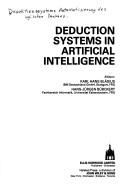| Listing 1 - 10 of 15 | << page >> |
Sort by
|

ISBN: 0821835505 9780821835500 Year: 2007 Publisher: Providence (R.I.): American mathematical society,
Abstract | Keywords | Export | Availability | Bookmark
 Loading...
Loading...Choose an application
- Reference Manager
- EndNote
- RefWorks (Direct export to RefWorks)
Mathematicians --- Logic, symbolic and mathematical. --- Gentzen, Gerhard.

ISBN: 3764365749 9783764365745 Year: 2001 Publisher: Basel: Birkhäuser,
Abstract | Keywords | Export | Availability | Bookmark
 Loading...
Loading...Choose an application
- Reference Manager
- EndNote
- RefWorks (Direct export to RefWorks)
Mathematicians --- Logic, symbolic and mathematical. --- Gentzen, Gerhard.
Book
Year: 1965 Publisher: Stockholm: Almqvist och Wiksell,
Abstract | Keywords | Export | Availability | Bookmark
 Loading...
Loading...Choose an application
- Reference Manager
- EndNote
- RefWorks (Direct export to RefWorks)
Logic --- Logic, symbolic and mathematical --- Modality (Logic) --- Gentzen, Gerhard
Book
Year: 1965 Publisher: Stockholm : Almqvist and Wiksell,
Abstract | Keywords | Export | Availability | Bookmark
 Loading...
Loading...Choose an application
- Reference Manager
- EndNote
- RefWorks (Direct export to RefWorks)
Logic. --- Logic, Symbolic and mathematical. --- Modality (Logic). --- Gentzen, Gerhard,

ISBN: 0486446557 9780486446554 Year: 2006 Publisher: Mineola: Dover,
Abstract | Keywords | Export | Availability | Bookmark
 Loading...
Loading...Choose an application
- Reference Manager
- EndNote
- RefWorks (Direct export to RefWorks)
This volume examines the notion of an analytic proof as a natural deduction, suggesting that the proof's value may be understood as its normal form -- a concept with significant implications to proof-theoretic semantics.
Logic. --- Logic, Symbolic and mathematical. --- Modality (Logic) --- Gentzen, Gerhard, --- Modality (Logic). --- Logic --- Logic, Symbolic and mathematical
Book
ISBN: 9780444534194 0444534199 9786613838872 0080957749 1283526425 072042254X 9781283526425 661383887X 9780080957746 9780720422542 Year: 1969 Publisher: Amsterdam: North-Holland,
Abstract | Keywords | Export | Availability | Bookmark
 Loading...
Loading...Choose an application
- Reference Manager
- EndNote
- RefWorks (Direct export to RefWorks)
Provability, Computability and Reflection
Logic, Symbolic and mathematical. --- Mathematics --- Logique symbolique et mathématique --- Mathématiques --- EPUB-LIV-FT ELSEVIER-B --- Metamathematics. --- Logic, Symbolic and mathematical --- Algebra of logic --- Logic, Universal --- Mathematical logic --- Symbolic and mathematical logic --- Symbolic logic --- Algebra, Abstract --- Metamathematics --- Set theory --- Syllogism --- Philosophy --- 510.6 --- 510.6 Mathematical logic --- Gentzen, Gerhard --- Oeuvres --- Écrits. --- Written works. --- Logic, symbolic and mathematical --- Logique mathématique --- Gentzen, Gerhard.

ISBN: 0745804098 047021550X 9780745804095 9780470215500 Year: 1989 Volume: vol *28 Publisher: Chichester: Ellis Horwood,
Abstract | Keywords | Export | Availability | Bookmark
 Loading...
Loading...Choose an application
- Reference Manager
- EndNote
- RefWorks (Direct export to RefWorks)
AI(Artificial intelligence) --- Artificial intelligence --- Artificial thinking --- Artificiële intelligentie --- Automatic theorem proving --- Electronic brains --- Intellectronics --- Intelligence [Artificial ] --- Intelligence artificielle --- Intelligent machines --- Kunstmatige intelligentie --- Machine intelligence --- Theorema's--Automatische bewijsvoering --- Thinking [Artificial ] --- Théorèmes--Démonstration automatique --- Cerveaux électroniques --- Machines intelligentes --- Pensée artificielle --- Automatic theorem proving. --- Artificial intelligence. --- Unification --- Resolution --- Graph --- Prolog (langage de programmation) --- Induction --- Gentzen Calculus --- Logic
Book
ISBN: 3319101021 331910103X Year: 2015 Publisher: Cham : Springer International Publishing : Imprint: Springer,
Abstract | Keywords | Export | Availability | Bookmark
 Loading...
Loading...Choose an application
- Reference Manager
- EndNote
- RefWorks (Direct export to RefWorks)
Gerhard Gentzen has been described as logic’s lost genius, whom Gödel called a better logician than himself. This work comprises articles by leading proof theorists, attesting to Gentzen’s enduring legacy to mathematical logic and beyond. The contributions range from philosophical reflections and re-evaluations of Gentzen’s original consistency proofs to the most recent developments in proof theory. Gentzen founded modern proof theory. His sequent calculus and natural deduction system beautifully explain the deep symmetries of logic. They underlie modern developments in computer science such as automated theorem proving and type theory. .
Computer science. --- Mathematical Theory --- Mathematics --- Physical Sciences & Mathematics --- Proof theory --- Data processing. --- Gentzen, Gerhard. --- Mathematics. --- Mathematical logic. --- Mathematical Logic and Foundations. --- Mathematical Logic and Formal Languages. --- Logic, Symbolic and mathematical. --- Informatics --- Science --- Algebra of logic --- Logic, Universal --- Mathematical logic --- Symbolic and mathematical logic --- Symbolic logic --- Algebra, Abstract --- Metamathematics --- Set theory --- Syllogism
Book
ISBN: 3319421204 3319421190 Year: 2017 Publisher: Cham : Springer International Publishing : Imprint: Springer,
Abstract | Keywords | Export | Availability | Bookmark
 Loading...
Loading...Choose an application
- Reference Manager
- EndNote
- RefWorks (Direct export to RefWorks)
Gerhard Gentzen is best known for his development of the proof systems of natural deduction and sequent calculus, central in many areas of logic and computer science today. Another noteworthy achievement is his resolution of the embarrassing situation created by Gödel's incompleteness results, especially the second one about the unprovability of consistency of elementary arithmetic. After these successes, Gentzen dedicated the rest of his short life to the main problem of Hilbert's proof theory, the question of the consistency of analysis. He was arrested in the summer of 1945 with other professors of the German University of Prague and died soon afterward of starvation in a prison cell. Attempts at locating his lost manuscripts failed at the time, but several decades later, two slim folders of shorthand notes were found. In this volume, Jan von Plato gives an overview of Gentzen's life and scientific achievements, based on detailed archival and systematic studies, and essential for placing the translations of shorthand manuscripts that follow in the right setting. The materials in this book are singular in the way they show the birth and development of Gentzen's central ideas and results, sometimes in a well-developed form, and other times as flashes into the anatomy of the workings of a unique mind.
Mathematics. --- History. --- Mathematical logic. --- History of Mathematical Sciences. --- Mathematical Logic and Foundations. --- Mathematics --- Gentzen, Gerhard. --- Math --- Science --- Logic, Symbolic and mathematical. --- Algebra of logic --- Logic, Universal --- Mathematical logic --- Symbolic and mathematical logic --- Symbolic logic --- Algebra, Abstract --- Metamathematics --- Set theory --- Syllogism --- Annals --- Auxiliary sciences of history
Book
ISBN: 1400885035 0691174172 Year: 2017 Publisher: Princeton, NJ : Princeton University Press,
Abstract | Keywords | Export | Availability | Bookmark
 Loading...
Loading...Choose an application
- Reference Manager
- EndNote
- RefWorks (Direct export to RefWorks)
The information age owes its existence to a little-known but crucial development, the theoretical study of logic and the foundations of mathematics. The Great Formal Machinery Works draws on original sources and rare archival materials to trace the history of the theories of deduction and computation that laid the logical foundations for the digital revolution.Jan von Plato examines the contributions of figures such as Aristotle; the nineteenth-century German polymath Hermann Grassmann; George Boole, whose Boolean logic would prove essential to programming languages and computing; Ernst Schröder, best known for his work on algebraic logic; and Giuseppe Peano, cofounder of mathematical logic. Von Plato shows how the idea of a formal proof in mathematics emerged gradually in the second half of the nineteenth century, hand in hand with the notion of a formal process of computation. A turning point was reached by 1930, when Kurt Gödel conceived his celebrated incompleteness theorems. They were an enormous boost to the study of formal languages and computability, which were brought to perfection by the end of the 1930s with precise theories of formal languages and formal deduction and parallel theories of algorithmic computability. Von Plato describes how the first theoretical ideas of a computer soon emerged in the work of Alan Turing in 1936 and John von Neumann some years later.Shedding new light on this crucial chapter in the history of science, The Great Formal Machinery Works is essential reading for students and researchers in logic, mathematics, and computer science.
Information technology --- Computers --- History. --- Arend Heyting. --- Begriffsschrift. --- Bertrand Russell. --- David Hilbert. --- Earth. --- Ernst Schröder. --- Eugenio Beltrami. --- Gentzen. --- George Boole. --- Gerard Gentzen. --- Gottlob Frege. --- Guiseppe Peano. --- Gödel. --- Göttingen. --- Hermann Grassmann. --- Heyting algebras. --- Hilbert. --- Karl Menger. --- Kurt Gödel. --- Kurt Hensel. --- Leopold Kronecker. --- Moritz Schlick. --- Paul Bernays. --- Peano. --- Principia Mathematica. --- Rudolf Carnap. --- Thoralf Skolem. --- Vienna Circle. --- algebraic equations. --- algebraic logic. --- algorithmic computability. --- angles. --- arithmetic. --- assumptions. --- axioms. --- basic notions. --- calculus. --- classical arithmetic. --- computation. --- connectives. --- contemporary logic. --- deduction. --- deductive reasoning. --- digital revolution. --- finitary reasoning. --- finitism. --- geometry. --- hypothetic reasoning. --- incompleteness theorems. --- indirect proofs. --- inference. --- information age. --- intuistic arithmetic. --- lattice theory. --- logic. --- logical empiricism. --- logical structure. --- logical truths. --- mathematical logic. --- mathematical proofs. --- mathematical roots. --- mathematics. --- negation. --- non-Euclidan geometries. --- notation. --- one-place predicates. --- parallel postulate. --- philosophy. --- programming language. --- proof. --- pure thinking. --- quantificational inferences. --- theorems. --- triangles.
| Listing 1 - 10 of 15 | << page >> |
Sort by
|

 Search
Search Feedback
Feedback About UniCat
About UniCat  Help
Help News
News